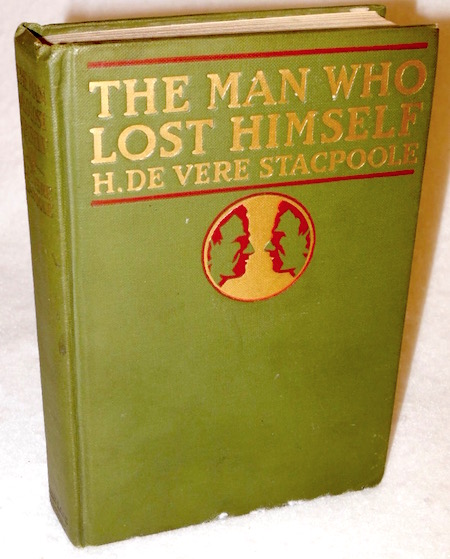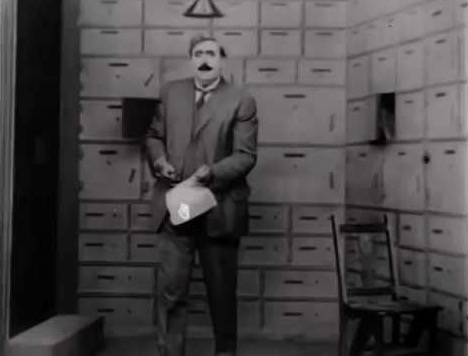THE MAN WHO LOST HIMSELF (14)
By:
May 28, 2018

This year marks the 100th anniversary of a forgotten Avenger/Artful Dodger-type adventure novel, The Man Who Lost Himself. A man down on his luck wakes up after a drunken night in London only to discover… that he has somehow slipped into the identity of a wealthy aristocrat! HiLoBooks is pleased to serialize this funny, thrilling yarn by H. De Vere Stacpoole — best known as author of The Blue Lagoon — here at HILOBROW.

A.S. Voles, money lender and bill discounter, lived over his business. That is to say his office was his dining room. He owned the house in Jermyn Street. Jones, dismissing the taxi, rang the bell and was admitted by a man servant, who, not sure whether Mr. Voles was in or not, invited the visitor into a small room on the right of the entrance hall and closed the door on him.
The room contained a desk table, three chairs, a big scale map of London, a Phoenix Insurance Almanac, and a photogravure reproduction of Mona Lisa. The floor was covered with linoleum, and the window gave upon a blank wall.
This was the room where creditors and stray visitors had to wait. Jones took a chair and looked about him.
Humanity may be divided into three classes: those who, having seen, adore, those who tolerate, and those who detest Mona Lisa. Jones detested her. That leery, sleery, slippery, poisonous face was hateful to him as the mask of a serpent.
He was looking at the lady when the door opened and in came Voles.
Voles looked yellower and older this morning, but his face showed nothing of resentment. The turning of the Earl of Rochester upon him had been the one great surprise of his life. He had always fancied that he knew character, and his fancy was not ill founded. His confidence in himself had been shaken.
“Good morning,” said Jones. “I have come to have a little talk with you.”
“Sit down,” said Voles.
They seated themselves, Voles before the desk.
“I haven’t come to fight,” said Jones, “just to talk. You known that Marcus Mulhausen has got that Welsh land from me for five thousand, and that it is worth maybe a million now.”
Voles nodded.
“Well, Mulhausen has to give that property back.”
Voles laughed.
“You needn’t laugh. You have seen my rough side. I’m holding the smooth towards you now — but there is no occasion to laugh. I’m going to skin Mulhausen.”
“Well,” said Voles. “What have I to do with that?”
“You are the knife.”
“Oh!”
“Yes, indeed. Let’s talk. When you got that eight thousand from me, you were only the agent of the Plinlimon woman, and she was only the agent of Marcus. She got something, you got something, but Marcus got the most. Julian got something too, but it was Marcus got the joints. He gave you three the head, and the hoofs, and the innards, and the tail. I’ve had it out with the Plinlimon woman and I know. You were a gang.”
Voles heaved up in his chair.
“What more have you to say?” asked he thickly.
“A lot. There is nothing more difficult to get at than a gang, because they cover each other’s traces. I pay you a certain sum in cash, you deduct your commission and hand the remainder over to the Plinlimon woman, she pays her Pa, and gets a few hundred to pay her milliner. Who’s to prove anything? No cheques have passed.”
“Just so,” said Voles.
“I’m glad you see my point,” replied Jones. “Now if you can’t untie a knot, you can always cut it if you have a knife — can’t you?”
Voles shrugged his shoulders.
“Well, I said you were a knife, didn’t I, and I’m going to cut this knot with you, see my point?”
“Not in the least.”
“I’m sorry, because that makes me speak plain, and that’s unpleasant. This is my meaning. I have to get that property back, or else I will go to the police and rope in the whole gang. Tell the whole story. I will accuse Marcus. Do you understand that? Marcus, and Marcus’ daughter, and Marcus’ son, and you. And I won’t do that to-morrow, I’ll do it to-day. To-night the whole caboodle of you will be in jail.”
“You said you hadn’t come to fight,” cried Voles. “What do you want? Haven’t you had enough from me? Yet you drive me like this. It’s dangerous.”
“I have not come to fight. At least not you. On the contrary, when I get this property back, if it turns out worth a million, I’ll maybe pay you your losses. You’ve been paying the piper for Marcus, it seems to me.”
“I have,” groaned Voles.
The two words proved to Jones that he was right all through.
“Well, it’s Marcus I’m up against, and you have to help me.”
Then Voles began to speak. The something Oriental in his nature, the something that had driven him rushing with outspread arms at the constable that evening, began now to talk. (*)
Help against Marcus! What could he do against Marcus? Why Marcus Mulhausen held him in the hollow of his hand. Marcus held everyone: his daughter, her husband, his own son Julian, to say nothing of A.S. Voles and others.
Jones listened with patient attention to all this, and when the other had finished and wiped the palms of his hands on his handkerchief, said:
“But all the same, Marcus is held by the fact that he forms one of a gang.”
Voles made a movement with his hand.
“Don’t interrupt me. The head of a shark is the cleverest part of it, but it has to suffer with the body when the whole shark is caught; that’s the fix Marcus is in. When I close on the lot of you, Marcus will be the first to go into the jug. Now, see here, you have got to take my orders; they won’t be hard.”
“What are they?”
“You have got to write me a note, which I will take to Marcus, telling him the game’s up, the gang’s burst, and to deliver.”
“Why d—n it, what ails you?” said Voles.
“What ails me?”
“You aren’t talking like yourself — you have never been like yourself since you’ve taken this line.”
Jones felt himself changing colour. In his excitement he had let his voice run away with him.
“It doesn’t matter a button whether I’m like myself or not,” said he, “you’ve got to write that note, and do it now while I dictate.”
Voles drummed on the desk with his fingers, then he took a sheet of paper and an envelope from a drawer.
“Well,” said he, “what is it to be?”
“Nothing alarming,” said the other. “Just three words. ‘It’s all up’ — how do you address him?”
Without reply Voles wrote.
Dear M.
It’s all up.
“That’ll do,” said Jones, “now sign your name and address the envelope.”
Voles did so.
Jones put the letter in his pocket.
“Well,” said he, “that ends the business. I hope, with this, and what I have to say to him, Marcus will part, and as I say, if things turn out as I hope, maybe I’ll right your losses — I have no quarrel with you — only Marcus.”
Suddenly Voles spoke.
“For God’s sake,” said he, “mind how you deal with that chap; he’s never been got the better of, curse him. Go cautiously.”
“You never fear,” said Jones.
(*) As ever, HiLoBooks deplores the racist, sexist, and anti-Semitic characterizations in the century-old books that we serialize.
SERIALIZED BY HILOBOOKS: Jack London’s The Scarlet Plague | Rudyard Kipling’s With the Night Mail (and “As Easy as A.B.C.”) | Arthur Conan Doyle’s The Poison Belt | H. Rider Haggard’s When the World Shook | Edward Shanks’ The People of the Ruins | William Hope Hodgson’s The Night Land | J.D. Beresford’s Goslings | E.V. Odle’s The Clockwork Man | Cicely Hamilton’s Theodore Savage | Muriel Jaeger’s The Man With Six Senses | Jack London’s “The Red One” | Philip Francis Nowlan’s Armageddon 2419 A.D. | Homer Eon Flint’s The Devolutionist | W.E.B. DuBois’s “The Comet” | Edgar Rice Burroughs’s The Moon Men | Charlotte Perkins Gilman’s Herland | Sax Rohmer’s “The Zayat Kiss” | Eimar O’Duffy’s King Goshawk and the Birds | Frances Hodgson Burnett’s The Lost Prince | Morley Roberts’s The Fugitives | Helen MacInnes’s The Unconquerable | Geoffrey Household’s Watcher in the Shadows | William Haggard’s The High Wire | Hammond Innes’s Air Bridge | James Branch Cabell’s Jurgen | John Buchan’s “No Man’s Land” | John Russell’s “The Fourth Man” | E.M. Forster’s “The Machine Stops” | John Buchan’s Huntingtower | Arthur Conan Doyle’s When the World Screamed | Victor Bridges’ A Rogue By Compulsion | Jack London’s The Iron Heel | H. De Vere Stacpoole’s The Man Who Lost Himself | P.G. Wodehouse’s Leave It to Psmith | Richard Connell’s “The Most Dangerous Game” | Houdini and Lovecraft’s “Imprisoned with the Pharaohs” | Arthur Conan Doyle’s “The Sussex Vampire”.
RADIUM AGE SCIENCE FICTION: “Radium Age” is HILOBROW’s name for the 1904–33 era, which saw the discovery of radioactivity, the revelation that matter itself is constantly in movement — a fitting metaphor for the first decades of the 20th century, during which old scientific, religious, political, and social certainties were shattered. This era also saw the publication of genre-shattering writing by Edgar Rice Burroughs, Sax Rohmer, E.E. “Doc” Smith, Jack London, Arthur Conan Doyle, Aldous Huxley, Olaf Stapledon, Karel Čapek, H.P. Lovecraft, Charlotte Perkins Gilman, Yevgeny Zamyatin, Philip Gordon Wylie, and other pioneers of post-Verne/Wells, pre-Golden Age “science fiction.” More info here.
READ GORGEOUS PAPERBACKS: HiLoBooks has reissued the following 10 obscure but amazing Radium Age science fiction novels in beautiful print editions: Jack London’s The Scarlet Plague, Rudyard Kipling’s With the Night Mail (and “As Easy as A.B.C.”), Arthur Conan Doyle’s The Poison Belt, H. Rider Haggard’s When the World Shook, Edward Shanks’ The People of the Ruins, William Hope Hodgson’s The Night Land, J.D. Beresford’s Goslings, E.V. Odle’s The Clockwork Man, Cicely Hamilton’s Theodore Savage, and Muriel Jaeger’s The Man with Six Senses. For more information, visit the HiLoBooks homepage.
